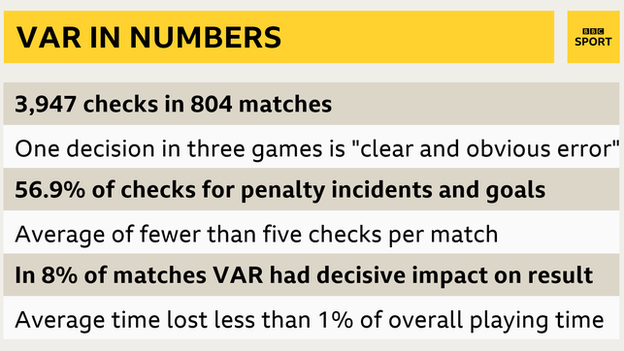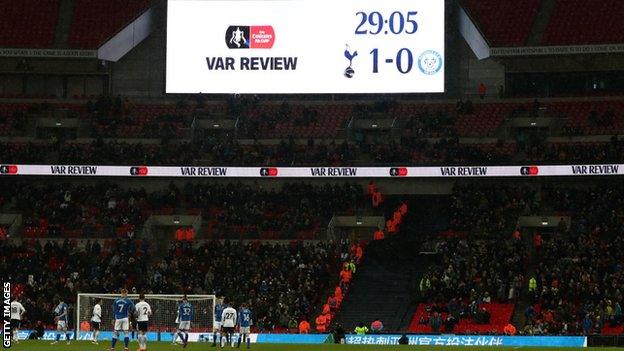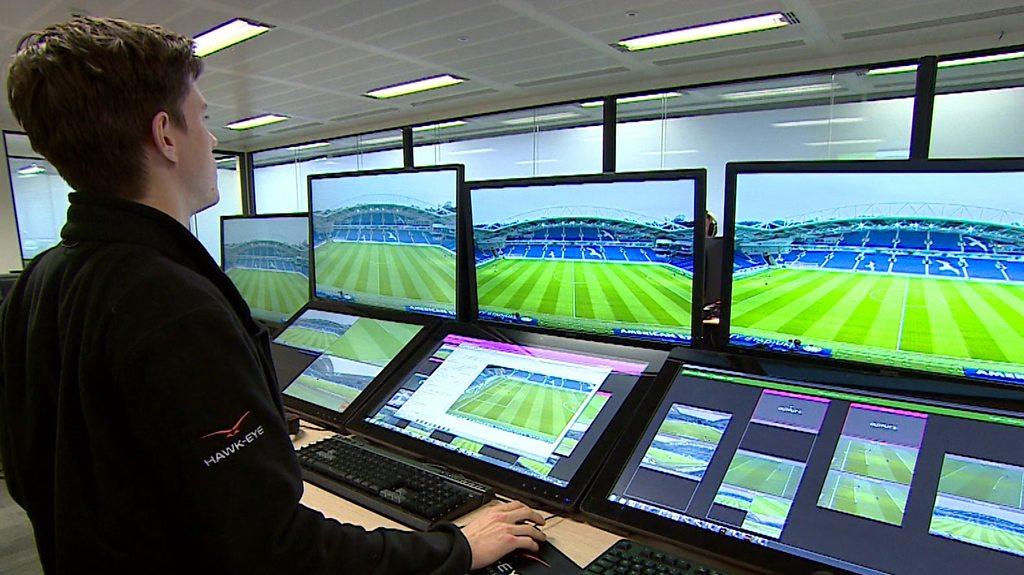VAR: Premier League clubs not expected to approve VAR for next season
- Published
- comments
How does VAR work?
Premier League clubs are not expected to introduce video assistant referees next season, even if football's lawmakers approve them on Saturday.
BBC Sport understands several teams have concerns over the trial games.
It is thought clubs only agree on some of the reasons to review game-changing incidents.
The International Football Association Board (Ifab) is expected to approve VAR when it meets in Zurich, in time for this summer's World Cup in Russia.
It is currently being used in selected domestic cup matches.
The system was described as "comical" and "embarrassing" after Tottenham's 6-1 FA Cup win over Rochdale on Wednesday, when a goal was disallowed and a converted penalty overturned.
It is expected that any domestic league or competition would have to adopt VAR protocols for every game.
Some Premier League clubs want VAR to be used only for matters of fact, such as whether incidents take place inside the penalty area and cases of mistaken identity.
There are also concerns over the number and quality of officials needed to officiate a full programme of fixtures.
Some referees have received the necessary training and several have officiated in FA Cup and League Cup games this season.
Sam Allardyce - VAR not being used properly
However, several clubs may want to see more referees exposed to VAR in match situations, with the kind of pressure placed upon them that is difficult or impossible to recreate outside of a live game.
The Premier League says it is "open to considering new technology that assists match officials without disrupting the flow of the game".
A statement to BBC Sport read: "We are monitoring closely the video assistant referee trials being conducted in other competitions.
"The evidence and learning provided by those trials will inform further discussions with our clubs later this season."
The only voice of doubt on the Ifab board is believed to come from the Football Association of Wales.
Six votes are needed for VAR to pass into law, with Fifa controlling four and the Home Nations one each.
Leagues and competitions, including the World Cup, would then need to apply to Ifab for permission to implement the technology.
If Ifab votes to bring in VAR, at least 14 of the Premier League clubs, who will meet in the coming weeks, must vote for VAR to be introduced to the top flight.
'Greater fairness with the occasional interruption'
FA Cup: Mata's goal ruled out by VAR at Huddersfield in the FA Cup fifth round
Ifab technical director and former Premier League referee David Elleray said 40 countries are using, trialling or are interested in VAR technology.
He told BBC Sport: "Football has to decide does it want to use in a system which will bring in greater accuracy and fairness, albeit with some delay occasionally.
"Or do they want to stay where they are, where the fans are complaining that something is clearly wrong, everybody watching on television can see it was wrong, everybody in the stadium can see on their mobile phones that it was wrong, but the one person who needed to see the replay wasn't allowed to look at the replay?
"People have to decide do they want greater fairness or do they want continued unfairness because they don't want to occasional interruption?"
Fifa president Gianni Infantino defended the time taken by the VAR to review decisions.
"Let's look at the facts," he said. "We've analysed almost 1,000 games and the reality is you lose an average of 90 seconds per game. Is that too long? Perhaps.
"But we lose an average of seven minutes per game due to throw-ins. If we lose seven minutes on throw-ins, we can lose 90 seconds to get decisions right."

Ifab figures released in January 2018
VAR - for and against
For: better decision-making
Technology increased the accuracy of decisions that can be reviewed from 93% to 98.9%, according to figures from the trial released by Ifab in January.
Former Australia and Middlesbrough goalkeeper Mark Schwarzer said: "Human error will still occur with VAR - other sports have shown that - but it dramatically reduces the number of errors.
"If we can limit the errors and get the game flowing as much as we can... to lose some fluency is worth it to get more of the decisions right."
Against: delays and confusion
Tottenham's win over Rochdale on Wednesday was dominated by VAR controversies. Fans booed as the half-time whistle was blown after five minutes were added on for video review delays.
Tottenham manager Mauricio Pochettino said: "The first half was a little bit embarrassing for everyone. I am not sure that system is going to help.
"Football is about emotion. If we are going to kill emotion, it's not so happy what we have seen. My opinion is we have the best referees in Europe. The referee is the boss on the pitch and has the last word always."
Elleray said he cannot see a good reason for football to not use VAR in all matches.
"It's difficult for people to argue that if you've got a system which fairly efficiently can correct clear and obvious errors which affect the outcome of matches that we shouldn't use that," he said.
"Is it really right that football is the only major sport that doesn't assist its referees by using technology?
"Our crucial challenge is to do it in a way that is has a minimal impact on the game."

VARs have been used in this season's FA Cup competition - including 14 times at Wembley on Wednesday
What has happened in England?
VAR technology has been used in 13 competitive matches - three in the Carabao Cup and 10 in the FA Cup.
Six decisions have been reversed, all in FA Cup matches:
16 January - Leicester City's Kelechi Iheanacho had a goal disallowed in the win over Fleetwood for offside, but it was then awarded after a VAR review.
27 January - In West Brom's victory at Liverpool, the referee and VAR consulted to rule out a goal for Albion's Craig Dawson for offside, and a penalty was awarded to Liverpool - which they missed - after the referee consulted the pitch-side TV monitor.
17 February - Juan Mata's goal in Manchester United's win at Huddersfield was disallowed for offside.
28 February - Erik Lamela's goal for Spurs was ruled out for a foul. Later, Tottenham were awarded a free-kick outside the penalty area, only for a spot-kick to be given after another VAR ruling. The penalty was converted but disallowed after Son Heung-min was adjudged to have stopped in his run-up before shooting.
A total of 14 incidents were assessed during the Tottenham match, including the two reviews, although officials say there has been an average of around eight per game in England.
What has been the reaction elsewhere?
Germany and Italy introduced VAR across their top leagues this season.
In the Bundesliga, poor application, delays and technical problems led to 47% of players wanting to abolish the system, according to a survey published in Kicker magazine in January.
Figures from the German league show VAR has been used in 216 matches. Decisions have been overturned on 46 occasions, but 11 were later found to be incorrect.
Gazzetta dello Sport described a "black Sunday for referees and VAR" after a series of controversies in Italy's Serie A.
But decisions which have been changed on video review could soon be shown on giant screens in Italian stadiums, offering fans more clarity.
The project's boss has said bookings for protests and unsporting behaviour had dropped since the system was introduced.
However, Uefa president Aleksander Ceferin said it will not be used in the Champions League next season.
"It might be a good project but we shouldn't rush it," he said.
- Published10 January 2018
